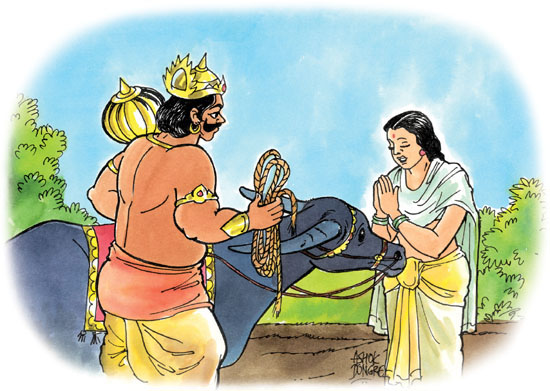Apr 18, 2025
Apr 18, 2025

After the morning labour they together took afternoon meals and Satyavan dozed off in the lap of her wife Savitri. Soon she saw the cruel hand of Death approaching her husband. Yamaraj - God of Death - himself had come to take away Satyavan's life-force!
Savitri protested and pleaded, but in vain. Death said, "O Savitri, your pleas do not affect me. You know everyone has to die at the destined hour. That time has come for Satyavan. Do not obstruct my way for I cannot change the hour and mode of death of anyone. Let me do my duty."
But Savitri was not to be put off. She followed Death and told him about her love for Satyavan. She told Yamaraj about the duty of Aryan lady to follow her husband in joy and sorrow, life and death. She would follow her husband in heaven or hell!
Thus all efforts of Yamaraj were futile to dissuade Savitri to follow him and turn back. Without any food or water, she continued to follow her husband for miles together. Yamaraj told her about the meaning of death and purpose of life and found Savitri intelligent and loyal to her husband. She was indeed Sati! Her love and devotion to Satyavan was pure, selfless, and true.
Yamaraj was pleased and offered Savitri two boons and return back to her home. Savitri first asked for the health and prosperity of her father-in-law. For the second boon, cleverly Savitri asked that she be blessed with hundred sons! When Yamaraj unwittingly granted the boon, Savitri was pleased and insisted that Death should release her husband now for without him how could she bear even one son! Even in dream she could not think of marrying other man. Yamaraj was trapped in his own words, and liberated the soul of Satyavan. Thus even Death is defeated by the chaste and noble wife.
Many more stories were told, of Nala and Damayanti, Rama and Sita, and the Sati. All these pious and noble ladies suffered innumerable hardships but their love for the husband was never diminished. The emphasis on chaste and pure life was always seen in Indian epics from ancient times. Sita, Sati, Savitri, and Damayanti are household names in India that bring out adoration, respect, and noble thoughts due to purity of their character.
Living Incognito - The Last year in Exile
Thus twelve year period of exile was about to end. Pandavas decided to pass the last additional (thirteenth) year incognito, as decreed, in the capital city of the King Virata. For this purpose, lest they should be detected, Pandavas disguised themselves as follows:
Yudhisthira -- As he was well versed with both the scriptures and skills of dice, rules and functioning of royal court, Yudhisthira decided to serve the king in the capacity of his adviser and priest. He assumed the name as Kankanbhata.
Bhima - His mighty and huge body required much food to satisfy his appetite. Therefore, Bhima decided to work in the Royal kitchen as the chief cook assuming the name of Ballava.
Arjuna - Arjuna was destined to pass one year as eunuch (thanks to the curse of Urvashi of Heaven). Therefore, it was decided that he teach dance and music to the princess Uttara in the guise of eunuch assuming the name Brihnnala.
Nakul became Granthic, the caretaker and guard to the horse stable as he was expert in the training and treatment of horses.
Sahadeva was in charge of cow-sheds and was called as Tantipal.
Draupadi was appointed as the chief maid-servant to the queen. She was to be known as Sairandhri.
Thus, separately, without letting others know that they were related, all the Pandavas entered into the service of the King Virata in the hope that the agents of Kauravas would not be able to spot them and inform Duryodhana about their hide out.
Story of Prince Keechaka
Keechaka was the grown up prince of the kingdom. King Virata had decided to hand over the reign of his kingdom to this son sooner than later. Keechaka was powerful and lustful. He was attracted towards the beauty and youthfulness of Draupadi ('Sairandhri'), the maid-servant of his mother.
He started making passes at her and instructed his attendants to tell Draupadi to bring food and drinks to his room.
Draupadi was aware of his evil nature. Secretly she told the powerful Bhima about Keechaka and his overtures. The angered Bhima told her to accept Keechaka's invitation to go his room that night. Keechaka was blinded with lust and drinks. He waited that night for Draupadi to come to his room. But instead Bhima went with the glass of milk for Keechaka dressed in lady's attire like Draupadi!
The ensuing fight between Bhima and Keechaka was very intense as both were equally powerful. Bhima in the end prevailed and Keechaka was killed.
King Virata came to know all about the sad end to his ignoble son. He was particularly displeased with his son because he tried to take undue advantage of a maid. Death of such a disgraceful son, in fact, did not hurt the king in any way. He kept the matter within himself by announcing that his son prince Keechaka would be away from the capital for a few months. In fact, King Virata fought on the side of Pandavas in the war.
Previous Page | Continue Next Page
12-Aug-2010
More by : Dr. C.S. Shah